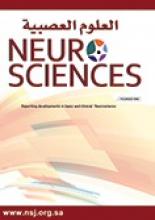To the Editor
We have read with interest the article by Alshahrani et al1 on a prospective cohort study of sleep behaviour and sleep quality during summer vacation and weeks 1-4 of the academic year among 385 female college students using a questionnaire and the Sleep Quality Scale (SQS).1 During the academic season, the number of students who slept before midnight increased, but the average sleep duration decreased, sleep quality deteriorated, sleep satisfaction decreased, and daytime sleepiness and fatigue increased.1 It was concluded that students need to improve their sleep hygiene during vacations so that they have enough sleep during the day to have optimal energy and concentration for better academic performance.1 The study is encouraging, but some points should be discussed.
The first point is that sleep quality may depend not only on the time of year (school year vs. vacations) and gender, but also on a host of additional intrinsic and extrinsic factors. Intrinsic factors that influence sleep patterns and sleep quality include the ability to relax, the level of acute and chronic stress, the balance between sympathetic and parasympathetic tone, hormonal balance, personality type, social interactions, strategies for processing the day’s experiences, the level of physical activity, genetic background, and comorbidities. Comorbidities that can disrupt sleep include diseases of the central nervous system (CNS) (e.g. epilepsy, headaches, pituitary dysfunction, Parkinson’s disease, restless legs syndrome, sleep apnoea syndrome), lung diseases (e.g. asthma, infections, chronic bronchitis, COPD), heart diseases (e.g. heart failure, malignant ventricular arrhythmias, high blood pressure), gastrointestinal diseases (e.g. nausea, gastritis, reflux, diarrhoea, constipation, flatulence), chronic or acute infectious diseases (e.g. dental foci), urological diseases (e.g. pollakisuria, nocturia), orthopaedic diseases (e.g. musculoskeletal pain), metabolic diseases (e.g. hypoglycaemia), immunological diseases (e.g. arthritis, colitis, Crohn’s disease), occult malignancies, and a number of non-specific abnormalities such as pain, fever, acidosis/alkalosis, or autonomic disturbances. External factors that determine sleep quality include noise (inside (e.g. partner’s snoring, pets, air conditioning, refrigerator, telefone) or outside (e.g., animals, bells, cars, garbage collection, neighbours, airplanes) of the bedroom), brightness of the environment, temperature, humidity, level of electrosmog in the environment, air quality, vibrations, presence or absence of insects or other animals in the bedroom, relationship with neighbours in the adjacent apartment, dietary habits (e.g., quantity, timing and quality of food and liquids), current medication (e.g. anti-seizure medication), hypnotics, sedatives, neuroleptics, antidepressants, illegal drugs, alcohol, coffee, cola, black tea or Red Bull. These factors must be included in the analysis before final conclusions are drawn.
The second point is that no explanation is given as to why students go to bed earlier during the academic season than during the vacations.1 One would expect them to study late into the night and get up later in the morning. We should also know whether sleeping habits differ between study types.
The third point is that lack of sleep does not necessarily go hand in hand with a lack of appetite.1 On the contrary, increased food intake can compensate for the lack of sleep.2
The fourth point refers to the statement that “thinking difficulties” occurred more frequently during vacations than during the academic season.1 However, the methods section does not specify the means by which the quality of thinking was assessed.1 This discrepancy should be clarified.
A final point is that the conclusions in the summary do not fit the study and should be corrected.1
In summary, this interesting study has limitations that put the results and their interpretation into perspective. Addressing these limitations could strengthen the conclusions and support the message of the study. All unresolved issues need to be clarified before readers can uncritically accept the study’s message. The timing and quality of sleep may depend not only on gender and time of year, but also on a variety of other causal factors.
Sounira Mehri, Biochemistry Laboratory, LR12ES05 Nutrition-Functional Foods and Vascular Health, Faculty of Medicine, Monastir, Tunisia Josef Finsterer, Department of Neurology, Neurology & Neurophysiology Center, Vienna, Austria
Reply from the Author
No reply from the author
- Copyright: © Neurosciences
Neurosciences is an Open Access journal and articles published are distributed under the terms of the Creative Commons Attribution-NonCommercial License (CC BY-NC). Readers may copy, distribute, and display the work for non-commercial purposes with the proper citation of the original work.






